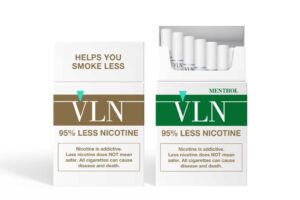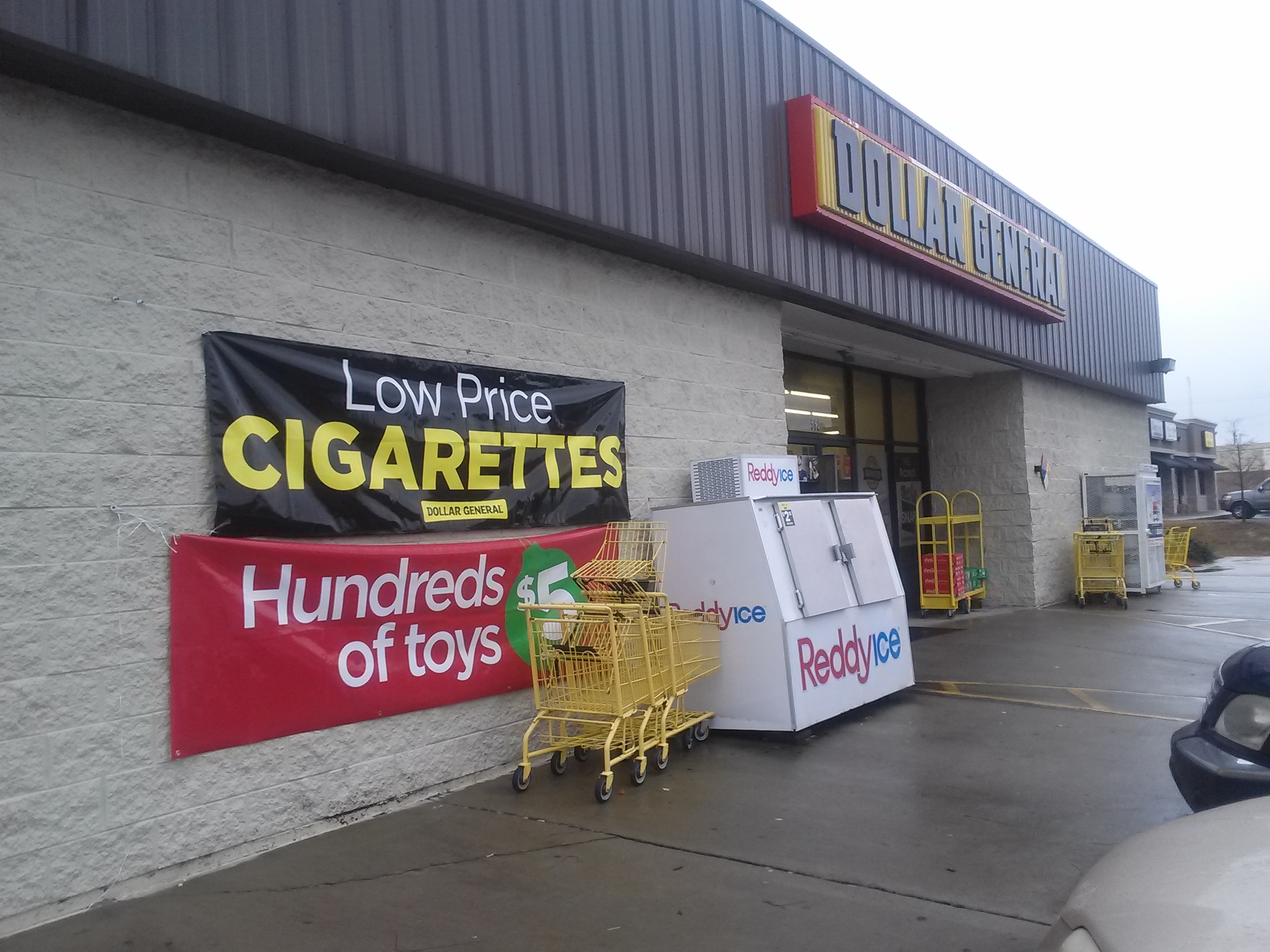Welcome to CounterTobacco.org’s “News and Research Roundup!” Each month we post a summary of the latest research, reports, and news stories on counteracting tobacco product sales and marketing at the point of sale (POS). Keeping up with what’s happening in the POS movement all across the country can help you choose policies and strategies that work best for your community. New research can help provide support for your work and evidence for the importance of the “War in the Store.” Have a story you don’t want us to miss? E-mail it to us!
New Research
Emerging Products
- Rapid-response surveillance of the first US test market for VLN cigarettes, Tobacco Control
 The low-nicotine cigarette brands of VLN King menthol and non-menthol were the first combustible cigarettes to receive FDA authorization as modified risk tobacco products and the second tobacco product to receive marketing authorization for “exposure modification” which means they can be marketed as presenting reduced exposure to a substance. In this case, the cigarettes can be marketed with the claims “95% less nicotine” “Helps reduce your nicotine consumption” and “…greatly reduces your nicotine consumption.” This study tracked VLN advertising, product placement, discounts, and pricing in 57 Chicago-area Circle K stores, the first test market for these products. Results showed 91.1% of the stores displayed exterior advertisements and 41.1% displayed interior advertising for VLN. A large majority of these stores (85.7%) also offered discounts on VLN cigarettes, which were priced similarly to premium brand high-nicotine cigarettes. This data shows that VLN cigarettes were marketed with similar strategies to other cigarette brands. The products were also marketed with some claims that were not within the bounds of what the FDA authorized. Future tracking in other test markets can provide additional data on how the cigarettes are marketed.
The low-nicotine cigarette brands of VLN King menthol and non-menthol were the first combustible cigarettes to receive FDA authorization as modified risk tobacco products and the second tobacco product to receive marketing authorization for “exposure modification” which means they can be marketed as presenting reduced exposure to a substance. In this case, the cigarettes can be marketed with the claims “95% less nicotine” “Helps reduce your nicotine consumption” and “…greatly reduces your nicotine consumption.” This study tracked VLN advertising, product placement, discounts, and pricing in 57 Chicago-area Circle K stores, the first test market for these products. Results showed 91.1% of the stores displayed exterior advertisements and 41.1% displayed interior advertising for VLN. A large majority of these stores (85.7%) also offered discounts on VLN cigarettes, which were priced similarly to premium brand high-nicotine cigarettes. This data shows that VLN cigarettes were marketed with similar strategies to other cigarette brands. The products were also marketed with some claims that were not within the bounds of what the FDA authorized. Future tracking in other test markets can provide additional data on how the cigarettes are marketed.
Policy Evaluation
- Use of a multi-method approach to rapidly assess the impact of public health policies at the state and local level: a case study of flavored e-cigarette policies, BMC Public Health
- The “Monitoring E-Cigarette Use Among Youth in Select U.S. Cities and States” project evaluated the impact of flavored e-cigarette related policies across the U.S. From February 2020-February 2023, data from online cross-sectional surveys and retail sales were gathered for three cities, one county, and eight states with existing or potential policy changes. The surveys, which were administered every 6 months to youth and young adults aged 13-24, asked about tobacco use, knowledge, attitudes, beliefs, behaviors, risk perceptions, product purchase patterns, sociodemographic factors, and other substance use. The retail sales data was purchased from Information Resources, Inc. (IRI) and analyzed monthly to assess market changes. No empirical analyses of data are included due to non-publicly available datasets, but the paper describes this multi-method approach to show how it can be employed by others to evaluate policy effects in a timely and flexible manner.
- Assessing the Effectiveness of Tobacco 21 Laws to Reduce Underage Access to Tobacco: Protocol for a Repeated Multi-Site Study, Methods and Protocols
- In the context of Tobacco 21, this study describes a protocol for underage buy attempts at over 180 tobacco or e-cigarette retailers in New Jersey, New York City, and Pitt County, North Carolina, to assess whether Tobacco 21 laws improve age of sale compliance among retailers. These underage buyers (aged 18-20) documented whether they were asked for identification by the store clerk, the product they attempted to purchase, and if they could successfully complete the purchase of tobacco products. Evaluation of this protocol and the results provide a helpful method to replicate for understanding the impact of Tobacco 21 laws and youth access reductions due to them.
- Learn more about Tobacco 21 policies.
Sales to Underage Youth
- Underage Sales of Tobacco in Dollar Stores and Top Grocery Stores, 2015–2020, U.S., American Journal of Preventive Medicine
 Dollar stores are a rapidly growing retail segment, and these stores provide access to youth-appealing tobacco products at cheap prices.This study compares underage tobacco sales in dollar stores with grocery stores. The researchers used FDA inspection data (64,059 inspections) from January 2015-March 2020 from the major dollar store chains Dollar General and Family Dollar and the popular grocery store chains Albertsons, Delhaize, Kroger, Publix, and Walmart. The inspection findings showed Family Dollar had the highest violation rate (12.1%) for underage sales, which was significantly higher than the other chains, even after controlling for neighborhood characteristics. This data shows a clear need to increase oversight of dollar stores like Family Dollar, and researchers suggest that the FDA could increase utilization of no-tobacco-sale orders and state attorney generals could implement an Assurances of Voluntary Compliance (AVC) agreement with Family Dollar to improve the chain’s compliance with age-of-sale laws.
Dollar stores are a rapidly growing retail segment, and these stores provide access to youth-appealing tobacco products at cheap prices.This study compares underage tobacco sales in dollar stores with grocery stores. The researchers used FDA inspection data (64,059 inspections) from January 2015-March 2020 from the major dollar store chains Dollar General and Family Dollar and the popular grocery store chains Albertsons, Delhaize, Kroger, Publix, and Walmart. The inspection findings showed Family Dollar had the highest violation rate (12.1%) for underage sales, which was significantly higher than the other chains, even after controlling for neighborhood characteristics. This data shows a clear need to increase oversight of dollar stores like Family Dollar, and researchers suggest that the FDA could increase utilization of no-tobacco-sale orders and state attorney generals could implement an Assurances of Voluntary Compliance (AVC) agreement with Family Dollar to improve the chain’s compliance with age-of-sale laws.- Learn more about Assurances of Voluntary Compliance (AVCs)
Vape Shops
- Changes in the Point-of-Sale Among Vape Shops in 6 US Metropolitan Areas Over Time, 2018-2021, Nicotine & Tobacco Research
- This study examined vape shop practices related to age-of-sale signage, promotions, and product sales in the cities of Atlanta, Boston, Minneapolis, Oklahoma City, San Diego, and Seattle. In 2018 and 2021, data collectors conducted audits to assess over 100 vape shops in these areas each year. The audit findings showed decreases in the proportion of vape shops with age-of-sale signs posted (90.5% in 2018; 73.9% in 2021), product/price promotion signage (89.9% in 2018; 65.5% in 2021), and e-liquid sampling (90% in 2018; 33.6% in 2021) and increases in the proportion of vape shops selling cannabis-related products and paraphernalia. This data reinforces the need to continue surveillance of vape shops to assess how vape shops adapt with legislative changes that restrict e-cigarette sales.
- Learn more about e-cigarettes at the point of sale.
Industry News
- RJ Reynolds debuts new menthol-free coolant in latest cigarette ahead of expected national ban, Fox Business; RJR uses California as test market for skirting upcoming national menthol cigarette ban, Politico
- Minnesota is latest to settle with e-cigarette maker Juul, The Hill
- Juul to pay $462 million to 6 states over claims it marketed vapes to minors, NBC News
- Judge: Reynolds Can Continue to Sell Vuse, Tobacco Reporter
- RJR, others appeal after flavored-tobacco ban upheld, Legal Newsline
- 22nd Century Group Rolls Out Private Label Cigarettes, Store Brands
- Survey: Americans Support Harm Reduction, Tobacco Reporter
POS Policy in the Media
Age of Sale
- [KS] You now must be 21 to purchase cigarettes in Kansas, as Gov. Laura Kelly signs age change, The Topeka Capital-Journal
- [NC] Cleveland County fighting to raise tobacco age to 21, The Shelby Star
- [NJ] Wawa To Require ID For Tobacco, Vape Purchases At Some NJ Locations, Patch
- [PA] Wawa Requires ID For All Tobacco, Vape Purchases At Some PA Locations, Patch
Tobacco Retailer Licensing
- [CA] City moves forward on tobacco retail license, Del Norte Triplicate
- [CA] La Mesa Council Moves Forward On Project Labor Agreement, Forms Committee To Consider Tobacco Ordinance, East County Magazine
- [MA] Northampton’s health board looks to curb permits for tobacco shops, Daily Hampshire Gazette
Flavored Tobacco Sales Restrictions
- [ME] Flavored tobacco ban takes effect in South Portland, Fox 23 Maine
- [ME] Debate heats up on Maine’s proposed flavored tobacco ban, Portland Press Herald
- [MN] RJR Loses Latest Appeal in Edina Flavor Tobacco Ban Case, Public Health Law Center
- [OR] Statewide ban on flavored tobacco in Oregon advances, Oregon Live
- [VT] Senate gives preliminary approval to flavored tobacco ban in VT, WCAX
Store Type Regulations
- [ND] North Dakota Passes Bill Allowing Cigar Lounges, Cigar Aficionado
- [VA] Chesterfield supervisors weigh new zoning rules on vape, CBD stores, Richmond BizSense
Endgame
- [CA] Tobacco sales phaseout withers in California without support from anti-tobacco advocates, CalMatters
- [NV] Bill That Would Have Banned Cigarettes In Nevada Dies In Committee, HalfWheel
International
Find more stories in last month’s News and Research Roundup.
Know of a story that we missed? Email us, and we’ll be sure to include it in next month’s roundup!


